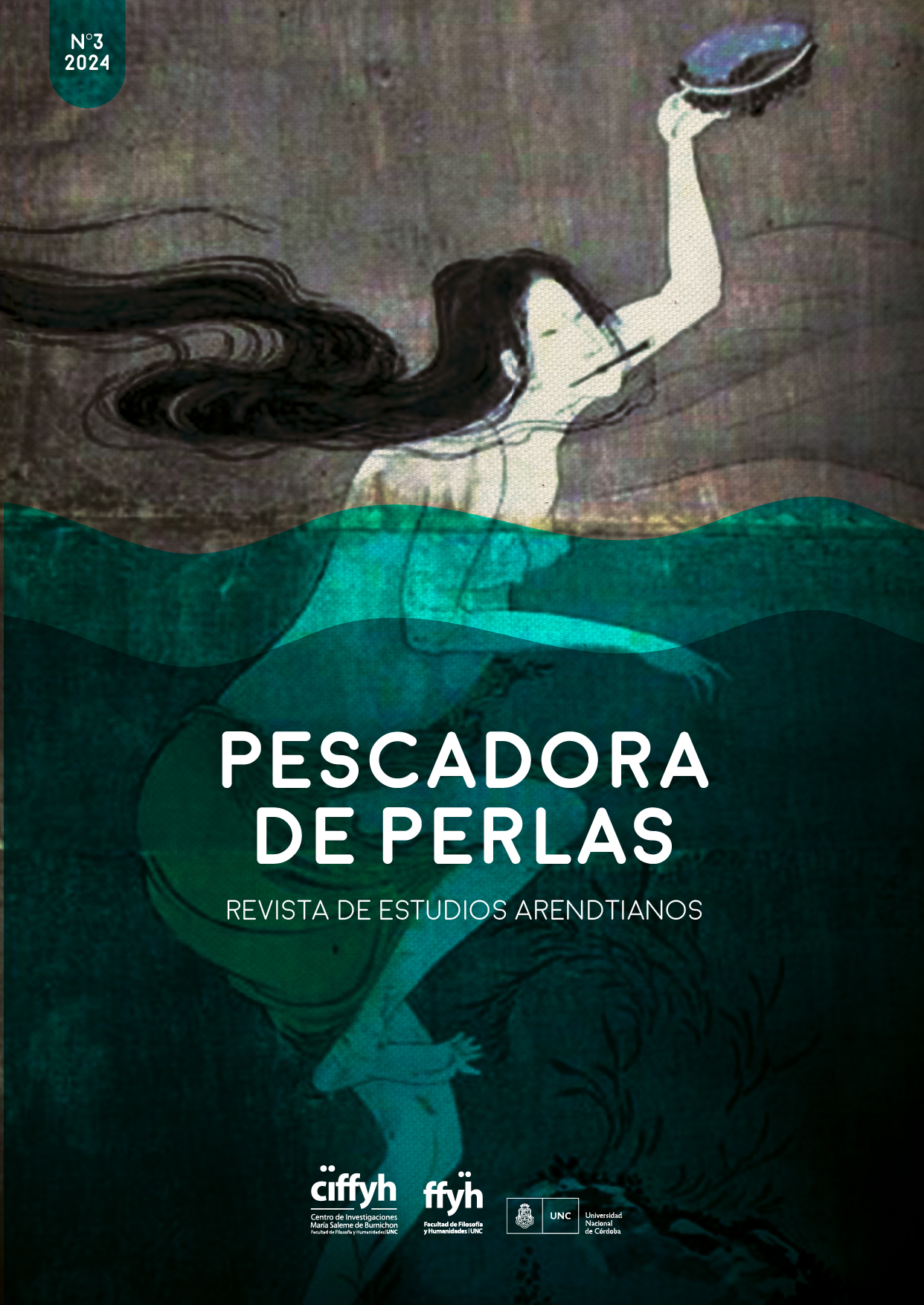Arendt's theory of judgement and the politics of the emotions
Keywords:
Arendt, emotions, concepts, judgment theoryAbstract
The objective of this article is to show that, if we carefully analyze the theory of judgment implicit in the Arendtian proposal and rethink emotions as social relations rather than as internal affections, it is inevitable to place the affections in close connection with the concepts. To carry out this rethinking of the Arendtian proposal of the trial, the approach of Sara Ahmed in The cultural politic of emotions (Ahmed, 2015) is recovered.
References
Ahmed, S. ([2004] 2015). La política cultural de las emociones. Programa Universitario de Estudios de Género-Universidad Nacional Autónoma de México.
Arendt, H. ([1958]1998). La condición humana. Paidós.
Arendt, H. (1982). Lectures on Kant's Political Philosophy (Ronald Beiner ed. and interpretative essay). Chicago University Press.
Arendt, H., Jasper, K. (1985). Briefwechsel 1928-1969. Piper.
Arendt, H. ([1983] 2001). Sobre la Humanidad en Tiempos de Oscuridad: reflexiones sobre Lessing. En: Hombres en tiempos de oscuridad. Gedisa. pp. 13-41.
Arendt, H. (1990). “Karl Jaspers ¿Ciudadano del mundo?”. En Hombres en tiempos de oscuridad. Gedisa.
Bhabha, H. K. (1994). The location of culture. Routledge.
Fanon, F. (1986). Black Skin, White Masks. Pluto Press.
Ferrara, A. (2008). La fuerza del ejemplo. Exploraciones del paradigma del juicio. Gedisa.
Forti, S. (2001). Vida del espíritu, tiempo de la polis. Hannah Arendt entre filosofía y política. Cátedra.
Flores, Val. (2019). Palabras preliminares. Sentirse precari*s. Afectos, emociones y gobiernos de los cuerpos. En Moretti, I. y Perrote, N. (Eds.). Sentirse precari*s. Afectos, emociones y gobiernos de los cuerpos (pp. 19-23). Editorial Universidad Nacional de Córdoba.
Hilb, C. (1994). Prólogo. En: El resplandor de lo público. Nueva Sociedad.
Hochschild, A. R. (1983). The Managed Heart: Commercialization of Human Feeling. University of California Press.
Hooks, B. (1989). Talking Back: Thinking Feminist, Thinking Black. South End Press
Illouz, E. (2007). Intimidades congeladas. Las emociones en el capitalismo. Katz.
Kant, I. (2003). Crítica del discernimiento (Traducción, edición e introducción de R.R. Aramayo Salvador Mas). Mínimo Tránsito.
Katz, J. (1999). How Emotions Work. University of Chicago Press.
Lorde, A. (1984). Sister Outsider: Essays and Speeches. Crossing Press
Lutz, C., y Lughod, L. (1990). Language and the politics of emotion. Cambridge University Press.
Mancini, F. (2016). Reseña de La política cultural de las emociones. En Debate feminista, 51: 88-91.
Mouffe, C. (2003). La paradoja democrática. Gedisa.
Muñoz Sánchez, M.T. (2023 en edición). El cosmopolitismo y la humanidad como comunidad de asentimiento. Acerca del mundo en común y el sentimiento de amor mundi. En Fernández Álvarez M.I.; Jaramillo, P. y Rangel Loera, N. (Eds.). Reinvenciones de lo común: Experimentos y composiciones desde el Sur. CLACSO/Universidad de los Andes.
Muñoz Sánchez, M.T. (2022). El juicio y las pasiones en política. Una teoría crítica del juicio. En C. Roldán, M. G. Navarro y X. Garzón Costumero (Eds.). El desván de la razón, cultivo de las pasiones, identidades éticas y sociedades digitales. Plaza y Valdés.
Muñoz Sánchez, M.T. (2010). Seguir políticamente una regla. Una mirada wittgensteineana al discurso político. Logoi, 18, pp. 93-113.
Muñoz Sánchez, M.T. (otoño-invierno 2004 a) La relevancia de la propuesta wittgensteiniana para el pensamiento político. Andamios, Revista del Colegio de Humanidades y Ciencias Sociales de la Universidad Autónoma de la Ciudad de México, 1, pp. 197-231.
Muñoz Sánchez, M.T. (julio-diciembre, 2004 b). El discurso político. Notas para un acercamiento wittgensteiniano. Signos Filosóficos, VI (12), pp. 93-115.
Said, E. W. (1978). Orientalism. Pantheon Books.
Zerilli, L. (2015). The Turn to Affect and the Problem of Judgment. New Literary History, 46, pp. 261-286.
Downloads
Published
Issue
Section
License
Copyright (c) 2024 Mayte Muñoz

This work is licensed under a Creative Commons Attribution-NonCommercial-ShareAlike 4.0 International License.
Consultar los Avisos de derecho de autor. Aquellos autores/as que tengan publicaciones con esta revista, aceptan los términos siguientes:
- Los/as autores/as conservarán sus derechos de autor sobre el texto, y garantizarán a la revista el derecho de primera publicación, el cual estará simultáneamente sujeto a la Licencia de reconocimiento de Creative Commons: Atribución – No Comercial – Compartir Igual (by-nc-sa); no se permite un uso comercial de la obra original ni de las posibles obras derivadas, la distribución de las cuales se debe hacer con una licencia igual a la que regula la obra original.
- Después de la publicación, los trabajos podrán ser reproducidos por los autores en otros medios siempre que no se omita la indicación de la publicación original en esta revista. En este sentido, los autores/as podrán adoptar otros acuerdos de licencia no exclusiva de distribución de la versión de la obra publicada (p. ej.: al depositarla en un archivo institucional o publicarla en un volumen monográfico) siempre que se indique la publicación inicial en Pescadora de Perlas.
- La cesión de derechos de primera publicación de los/as autores otorga a Pescadora de Perlas autorización para que el trabajo sea colocado en el repositorio institucional de la Universidad Nacional de Córdoba y difundido a través de las bases de datos.



